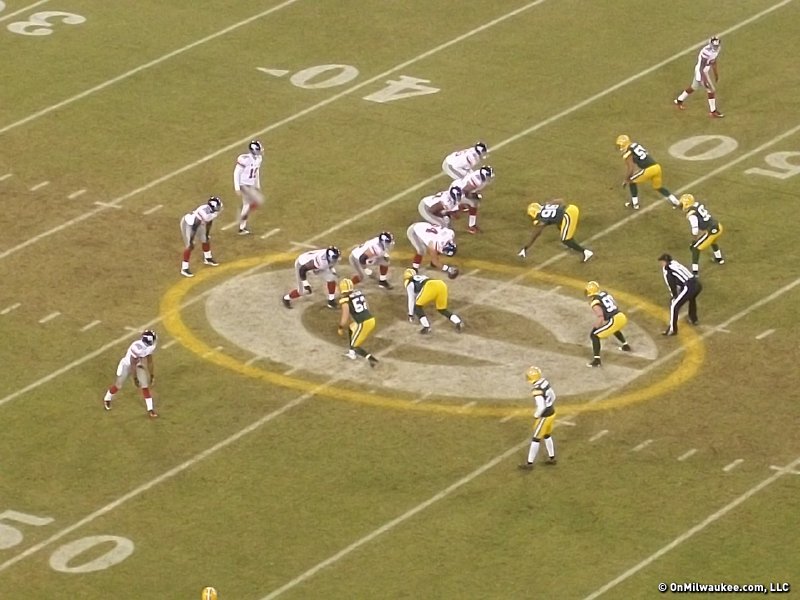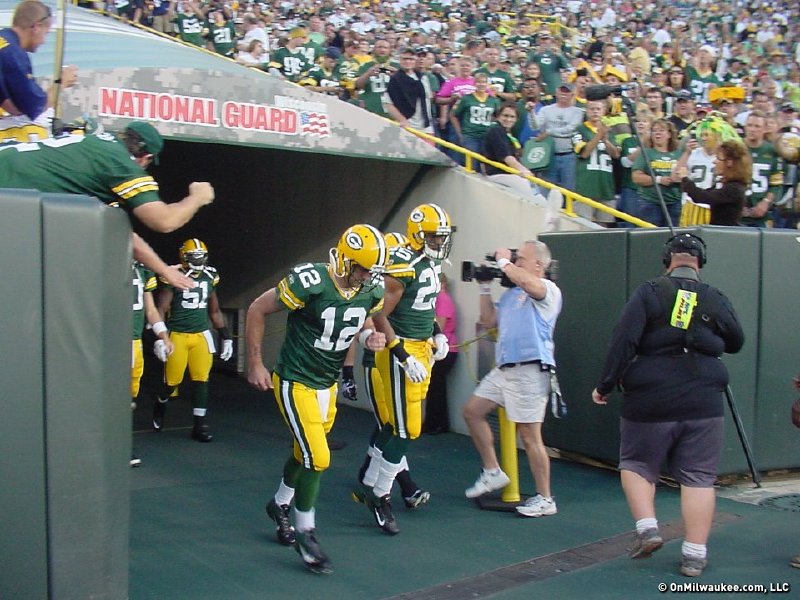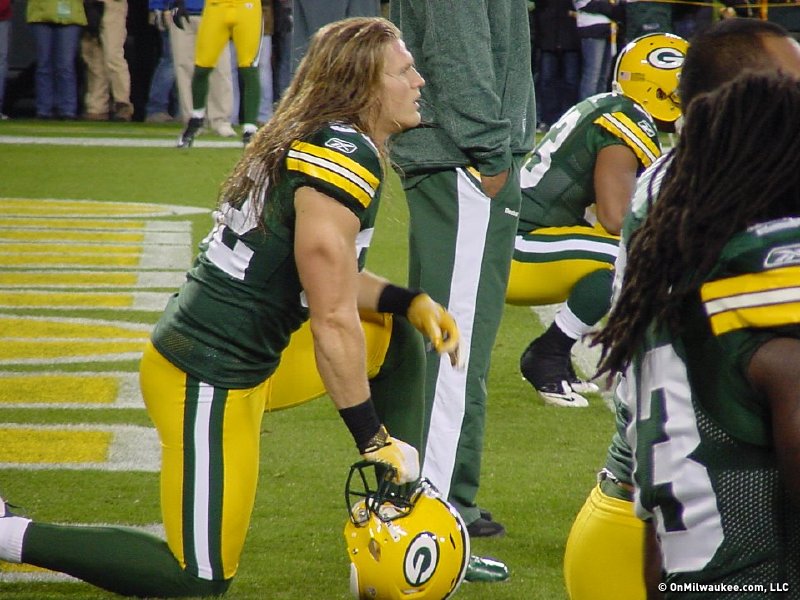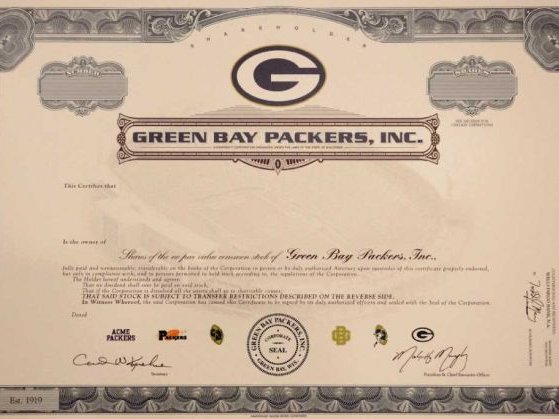Reports of Favre's retirement swept across the state Tuesday morning and the Packers confirmed the news at a press conference at Lambeau Field. General manager Ted Thompson and coach Mike McCarthy attended the briefing along with former team president Bob Harlan, but Favre did not.
A day later, the news is still sinking in for many Green Bay fans.
Many expected the 38-year-old would return for an 18th season after posting some of the best numbers of his career in 2007. Favre threw for 4,155 yards with 28 touchdowns and posted a 95.7 quarterback rating. The Packers finished 13-3 and advanced to the NFC Championship game for the first time since 1997 before falling to the New York Giants, 23-20, at Lambeau Field.
In a widely-circulated voice mail message to ESPN reporter Chris Mortensen, Favre didn't seem too optimistic that the Packers could replicate their 2007 success.
"If I felt like coming back -- and Deanna and I talked about this -- the only way for me to be successful would be to win a Super Bowl," Favre said in the message. "To go to the Super Bowl and lose, would almost be worse than anything else. Anything less than a Super Bowl win would be unsuccessful."
The Packers' season -- and Favre's career -- ended on a bittersweet note that day. Favre's last pass was an interception in overtime that led to Lawrence Tynes' game-winning field goal for the Giants.
"I was disappointed that the last pass I threw was intercepted," Favre said following that game. "For me, I kept thinking how many opportunities are we going to let slip away."
Few figures in Packers history -- including Curly Lambeau, Vince Lombardi and Bart Starr -- have had as much of an impact on the franchise as Favre, who teamed up with head coach Mike Holmgren, general manager Ron Wolf and free agent defensive end Reggie White to turn the Packers into champions after nearly three decades of futility.
"I've always said that the foundation for our revival was Ron Wolf, Mike Holmgren, Brett Favre and Reggie White," said Bob Harlan, who recently stepped down as team president. "Once we had those four people in place, we put the Packers back among the elite teams in the National Football League."
Return to glory
The Packers acquired Favre on Feb. 10, 1992 through a trade with Atlanta. General Manager Ron Wolf dealt a first-round pick (No. 17 overall, which was later traded to Dallas, which selected Kevin Smith) to the Falcons for Favre, who spent a majority of his rookie season on the bench in the doghouse of Falcons' head coach Jerry Glanville.
He spent the first three games of the 1992 season -- the first under head coach Mike Holmgren -- backing up Don Majikowski. Majikowski suffered an injuring during the Packers' third game of the season. Against Cincinnati at Lambeau Field, he tossed a 35-yard pass to wide receiver Kitrick Taylor with 13 seconds left to lead the Packers to a 24-23 victory.
Favre got the start the next week at Pittsburgh ... and was in the starting lineup for the next 252 games as well, setting an NFL record for consecutive starts by a quarterback.
"He was an integral part of the Packers' success, no question," Favre said following White's death in 2004. "Had it not been for Reggie, we don't make it to the Super Bowl.
"That's how important he was to the team. When he signed as a free agent, he changed the way people in and out of football looked at Green Bay as an NFL city. He helped the franchise get back to where it had been ... at the top."
In 1993, Favre and White he led the Packers to the playoffs for the first time since 1972. In the wild-card contest at the Pontiac Silverdome, Favre threw the game-winning touchdown to Sterling Sharpe; a 40-yard bomb with 55 seconds left. The Packers would go on to lose next week at Dallas, starting a career-long string of troubles for Favre at Texas Stadium.
Favre clinched another playoff berth in 1994 -- and ended the Packers' Milwaukee run -- in memorable fashion, scrambling and leaping over an Atlanta defender with 14 seconds left for a victory in the final game played at Milwaukee County Stadium.
"To me that was the game that jump-started our rise to prominence," Favre told longtime reporter Cliff Christl. "When I think of County Stadium, I think of that game."
Following that game, kicker Chris Jacke said the play summed up the third-year quarterback.
"It was vintage Brett Favre," then-kicker Chris Jacke said. "Brilliant and dumb at the same time."
Favre would win the first of his three consecutive NFL Most Valuable Player awards in 1995 after completing a league-best 4,413 yards. He set a team record with seven 300-yard passing games and led the NFC with 99.5 passer rating. The Packers, thanks to a dropped touchdown pass by the Steelers' Yancy Thigpen, finished the season 11-5 to win their first NFC Central Division Championship since 1972 and advanced to the NFC Championship Game for the first time since the 1967 Ice Bowl.
The Packers lost that game, 38-27, to the Cowboys at Texas Stadium. It set the stage for a Super Bowl season to come, but not until after a pretty significant bump in the road.
Wild life & recovery
Favre played his way out of Atlanta thanks to a hard-partying lifestyle that went back to his days at Southern Mississippi. Late nights were commonplace for the young Favre, who maintained those habits when he arrived in Green Bay. He, along with tight end Mark Chmura and offensive lineman Frank Winters, was known to tear up the town. The "Three Amigos" were regular fixtures at area bars and were heralded as much for their ability to knock back beers as they were for their ability to pick apart defenses.
All of Wisconsin was stunned in May of 1996, when a stoic Favre joined an equally straight-faced Mike Holmgren behind the table. Dressed in a grey sport coat with a collarless white shirt, Favre looked directly into the cameras and dropped a bomb.
It was that day that Favre announced he had an addiction to painkillers and would be entering the NFL's Substance Abuse Program. He would spend 46 days at the Menninger Clinic in Topeka, Kansas.
Upon his return, Favre stood before reporters and said that a Super Bowl championship was his only goal.
"You know, I'm going to beat this thing," Favre said on June 28. "I'm going to win a Super Bowl. And all I can tell people if they don't believe me is, 'Just bet against me.'"
Favre won that bet. He established team and NFC records with 39 touchdowns and led the conference with 3,899 yards as the Packers won the Central Division for the second straight year.
In the playoffs, Favre - who was surrounded by an amazing level of talent - set or tied four club records by completing 62 percent of his pass attempts for 617 yards with five touchdowns and just one interception.
He threw what may have been his best-known touchdown pass in Super Bowl XXXI. On the Packers' second play from scrimmage, Favre audibled at the line and launched a 54-yard pass to Andre Rison who ran untouched into the end zone to give the Packers the day's first score. Favre would later set a Super Bowl record connecting with Antonio Freeman on an 81-yard touchdown pass in the Packers' 35-21 victory over New England.
One of the most frequently-publicized pictures and videos of Favre came as a result of the score to Rison as Favre sprinted down the Superdome turf, helmet head high above his head.
Green Bay would return to the Super Bowl after the 1997 season. Favre three for three touchdowns but the Packers fell to Denver, 31-24.
"We scored three touchdowns," Favre told reporters. "We made our mistakes and they capitalized on them. They got 10 points off of turnovers and I think that was the difference in the game.
"We didn't see anything we didn't expect from them. They blitzed and we picked it up for the most part. We made two mistakes."
Leader of the pack
Favre and Holmgren teamed up to lead the Packers to the playoffs again in 1998, but they fell in a wild-card game at San Francisco on Steve Young's last-second touchdown pass to Terrell Owens.
It would be the end of an era.
Favre, while still a gunslinger, had evolved into a mature, stable quarterback on Holmgren's tutelage. He would be on his own now, and under Ray Rhodes, the Packers finished 8-8 in 1999, narrowly missing the playoffs.
Favre broke down following the first game of the 2000 campaign; a 28-24 come-from-behind victory over Oakland at Lambeau Field. Favre threw a one-yard touchdown pass to tight end Jeff Thomason with 11 seconds left to cap off an 82-yard drive that lasted 1 minute, 40 seconds.
He played a majority of the season trying to recover from a thumb injury suffered during the preseason that was aggravated in the Oakland game. Later in the season, Favre faced Holmgren for the first time. Favre was threw 14 of 35 passes for 180 yards with a touchdown.
He also threw four interceptions as the Packers lost 27-7. Rhodes would be fired after the season finale and Mike Sherman was brought in.
Trying to get back
While the Packers failed to return to the Super Bowl in the post-Holmgren era, Favre turned in several more memorable performances.
Perhaps the most impressive outing came on Dec. 22 in Oakland. Less than 24 hours following the death of his father, Irvin Favre played the game of his life. He threw four for four first-half touchdowns and finished with 399 total yards as the Packers routed the Raiders, 41-7, in front of a Monday Night Football national television audience.
"I knew that my dad would have wanted me to play," Favre said afterwards. "I love him so much and I love this game. It's meant a great deal to me, to my dad, to my family, and I didn't expect this kind of performance but I know he was watching tonight."
Favre walked off the field, embraced by Deanna, to the applause of the Packers fans that made the trip, as well as the cheers of Raiders Nation.
The season would end in bittersweet disappointment on a cold night in Philadelphia. The Packers, coming off an emotional overtime victory over Holmgren and the Seahawks at Lambeau field, fell to the Eagles in the infamous "4th and 26" divisional playoff game.
Favre threw for a pair of first-quarter touchdowns, but a costly overtime interception set up the Eagles' game-winning field goal.
Beginning of the end
When Wolf stepped down as general manager following the 2001 NFL draft, the player-personnel duties were handed to Sherman. With Favre as a catalyst, the Packers won divisional championships in 2002, 2003 and again in 2004, but were unable to get beyond the second round of the playoffs.
Following that stretch, Favre endured some of his worst seasons as a player. The Packers bottomed out at 4-12 in 2005. Sherman, who lost his GM duties before the season, was fired as head coach by the GM Ted Thompson.
Favre posted his worst statistics, completing just 61 percent of his passes (372 of 607) while throwing 29 interceptions compared to just 20 touchdowns. His passer rating of 70.9 was the lowest of his career.
After calling for the club to make a "statement" in free agency like it did by signing Reggie White in 1993, Favre finally made his announcement on April 26. Thompson had little to say at the time.
"The Green Bay Packers are very pleased that Brett has come to this decision, and look forward to a successful 2006 season," Thompson said in a statement posted on the team's Web site.
The 2006 campaign wasn't much better, but Favre and the Packers got on a roll at the end of the season, winning the final four games to finish 8-8 in McCarthy's rookie campaign.
Favre again led the league with 613 pass attempts (completing 343) while throwing for 18 touchdowns and 18 interceptions. In a teary, nationally-televised interview following a 26-7 New Year's Eve victory over the Bears to end the season, many thought that they had seen the last of No. 4.
"If this is the last game, I couldn't be more pleased with the outcome," Favre told NBC's Andrea Kremer after the game."
Favre announced that he would return for another season on Feb. 2. Many wondered what type of team he would be coming back to, but Favre seemed optimistic.
"I am so excited about coming back," Favre told the Sun-Herald. "We have a good nucleus of young players. We were 8-8 last year and that's encouraging.
"My offensive line looks good, the defense played good down the stretch. I'm excited about playing for a talented young football team."
Favre's season was reminiscent of his heyday and would have likely ended in his fourth MVP award, were it not for the performances by New England's Tom Brady and Indianapolis' Peyton Manning.
Legacy
During the surprising 2007 campaign, Favre firmly etched his name into the NFL record books. He surpassed Dan Marino on the all-time touchdown pass list when he hit Greg Jennings for a 16-yard slant in a 23-16 victory over the Vikings. Favre finished with 442 touchdowns, the most of all time.
Favre also holds the records for most passing yards (61,655), most completions (5,477), most attempts (8,758), most career victories as a quarterback (160) as well as the all-time mark for interceptions (288).
He's the only player in NFL history to be named MVP in three consecutive years and holds just about every offensive record in club history. Favre is a surely a first-ballot NFL hall of famer and his position amongst the league's best quarterbacks - and players - of all-time will be a hotly-debated topic for years to come.
"I don't think there's any doubt that he'll go down as the greatest player in the history of this organization," Harlan said. "His accomplishments for the Packers will be treasured forever.
"It's been a real privilege to watch this man's career, and we're all going to sit back and realize how fortunate we were."
Aside from his performance on the field, Favre will be remembered for the way he handled adversity. From the public way he grieved over the loss of his father to his Deanna's battle with breast cancer and the devestation of his family's home during Hurricane Katrina, Favre endured.
What's next?
Favre's retirement opens the door for Aaron Rogers to finally get his shot at starting. A 2005 first-round draft pick (No. 24 overall), Rodgers appeared in just five games over his first two seasons, completing 15 of 31 passes for 111 yards with an interception and no touchdowns.
In 2008, he made two appearances and saw his first significant professional playing time against Dallas after Favre left the game with an injury. He connected on 18 of 26 attempts for 201 yards and also recorded his first touchdown. Rodgers also ran five times for 30 yards in the Packers' 38-27 loss.
McCarthy talked to Rodgers Tuesday morning after the news broke to update him on the situation. He said that Rodgers was surprised and was wondering how Favre was doing.
When asked about the possibility of signing a veteran quarterback to compete with or back up Rodgers, Thompson skirted the issue.
"In terms of personnel," Thompson said. "What we're going to do with the team going forward and things like that, I think those questions are better served to address at a later time. I think this is more about Brett and his decision."
For the record, Rodgers was just eight years old and living in Chico, Calif. When Favre threw the touchdown pass to Taylor in 1992.







